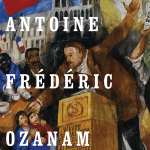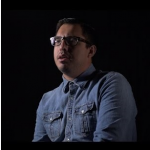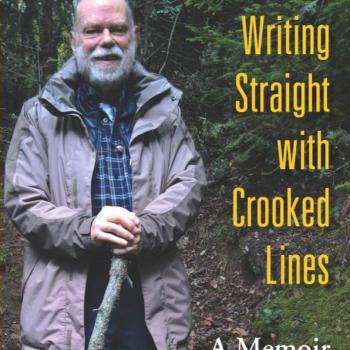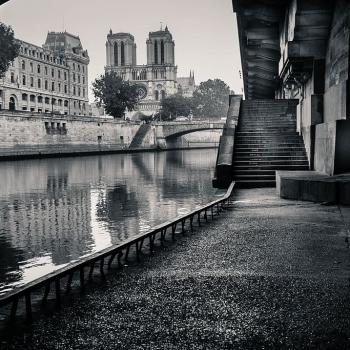 Like some hack sportswriter who skips the game but writes his piece by listening on the radio at home, I offer here a report on last week’s Trying to Say God conference at the University of Notre Dame, despite the fact I couldn’t make it there. (Family unexpectedly came in from out of town.)
Like some hack sportswriter who skips the game but writes his piece by listening on the radio at home, I offer here a report on last week’s Trying to Say God conference at the University of Notre Dame, despite the fact I couldn’t make it there. (Family unexpectedly came in from out of town.)
Happily, I was able to listen to some of the presentations posted as audio files on SoundCloud, courtesy of that estimable Patheos blog, Sick Pilgrim, whose proprietors (Jessica Mesman Griffith and Jonathan Ryan) were co-sponsors of the Notre Dame event, along with Patheos, Image Journal, Notre Dame’s School of Arts and Letters, Our Sunday Visitor and the University of St. Michael’s College (University of Toronto).
Not every talk was recorded but after listening to a few, I had the sensation that I had wandered onto the shores of a new country, indeed a place of re-enchantment, just as the conference’s subtitle (“Re-enchanting Catholic Literature”) promised.
Oddly, this two-day event–a mix of readings and panel discussions–was occasioned by a literary crisis of sorts. “Catholic literary culture today might best be described as a funeral for multiple corpses. This, for living Catholic writers, makes for a rather depressing set of circumstances to enter into,” wrote Kaya Oakes in an essay for America Magazine in 2014. The founders of the Trying to Say God conference (who included David Griffith of the Interlochen Center for the Arts, Sam Rocha of the University of British Columbia, and Ken Garcia of Notre Dame, in addition to Ryan and Griffith), agreed with Oakes that the problem isn’t a lack of serious, talented, and faithful Catholic artists—it’s that we lack a Catholic arts culture. And with this conference, they decided to do something about it.
The remarkable keynote address (you can read it here or listen on SoundCloud here) was by Bishop Daniel Flores (whose Tolkienish Twitter handle is @amigodefrodo!) and took up the theme of the poverty of the Word, touching along the way on the work of Dante, Bernanos, Jean-Luc Marion and the Mexican author and activist Javier Sicilia. I’ve never heard a churchman offer such a combination of social reflection, theology and literary culture as this. It not only set a tone for the event but reads like an aesthetic/ethical manifesto for the future.
I’ve been a fan of Heather King’s writing for some time and her talk called “A Portable Kingdom: Writing Our Lives” was her guide to the literary life, constructed as a series of brilliant and hilarious “tips for tragic-comic living”, as she called it. She is a great witness, in my view.
The panel entitled “Finding the Sacred in the Profane: The Role of Vulgarity in Religious Art” featured the wonderful Patheos blogger Rebecca Bratten Weiss, John Farrell (contributing writer at Forbes), and Jonathan Ryan (who is also an acclaimed author of paranormal thrillers). This topic was almost emblematic of the conference itself, as the group reflected on the embodied and earthy nature of much great art, from Boccaccio and Bosch to Ulysses and the Big Lebowski, with side glances at Guardians of the Galaxy and Quentin Tarantino. That self-described Rabelaisian Catholic, Artur Rosman, must have been a kind of ghostly presence hovering in the background here.
Also in attendance was Brother Guy Consolmagno, the director of the Vatican Observatory and a known aficionado of science fiction. His delightful conversation with sci-fi novelist Tim Powers and Powers’ own talk, “Catholicism and the Rules of Fantasy” are both posted on SoundCloud.
Briefly, a few more delectable items on SoundCloud:
-
“The New Abolitionists: Catholics Writing about Race” (panelists Karen Beattie, Jon Nilson, Christopher Pramuk, Marlena Graves)
-
“Not Always Sweet: Beyond Liturgical Cupcakes in Catholic Women’s Writing” (Colleen Mitchell, Kaya Oakes, Leticia Adams, Sonja Corbit, Rebecca Bratten Weiss, Sarah Margaret Babbs, moderator: Jessica Mesman Griffith)
-
“Notes from a Contemplative: Thomas Merton on the Art of Writing as Resistance and Protest” (Dave Griffith, Gordon Oyer, Kathleen Tarr, Cassidy Hall)
-
“Rendering the World Strange: Folk Piety and Imagination” (Kevin M. Johnson, Jessica Mesman Griffith, David Russell Mosley)
And there’s yet more audio from this wonderful Burning Man-for-the-somewhat-pious event, although it was apparently not possible to record every talk and panel. Listening to the voices of these gifted, somewhat mad folk, you realize that beyond the ugly roar of our public life, wonderful work is getting done by Catholic artists and writers whose goal is not and cannot be to resemble Flannery O’Connor or J. F. Powers.
Instead, I’m close to saying there’s a new (or very old) Catholic sensibility at work here, perhaps partly a working-out of the Theology of the Body to finally address the broken and vulnerable body. Or maybe the sensibility that Sam Rocha (in his new collection Tell Them Something Beautiful) calls funk phenomenology:
“If you want to play the funk, you must be properly initiated and learn to dwell authentically with others. If you want to gain my personal trust and respect to be able to affectionately call me a ‘dirty Mexican,’ you will have to dwell with me. And to dwell with me, you must love me. When that day comes, we will be funky friends. I’d rather have a real, rude, funky-ass friend than a deodorized, thoroughly gentrified so-called ‘friend.’ The former is a friend I might die for.”
All thanks to the organizers for this real, funky-ass event!












